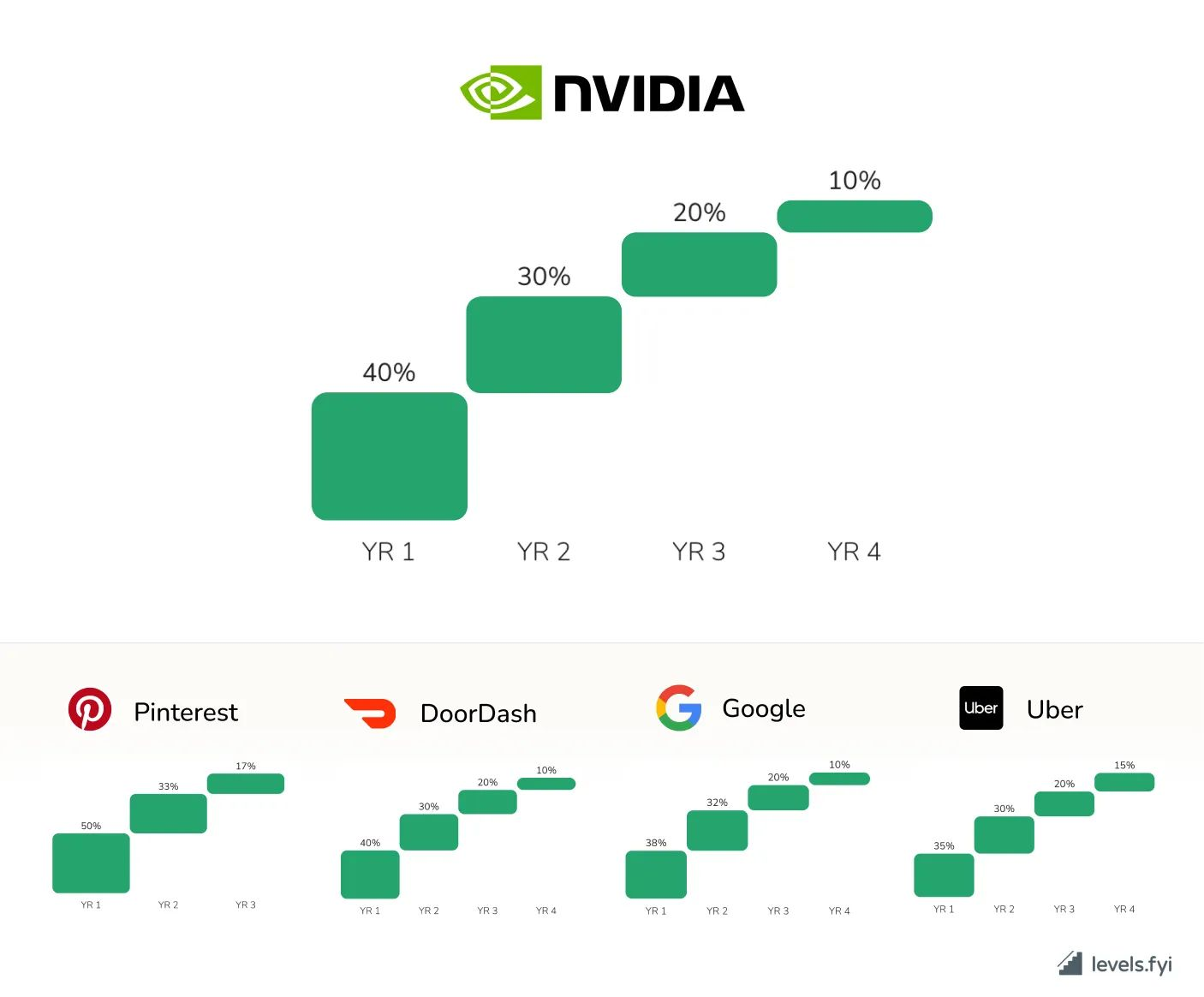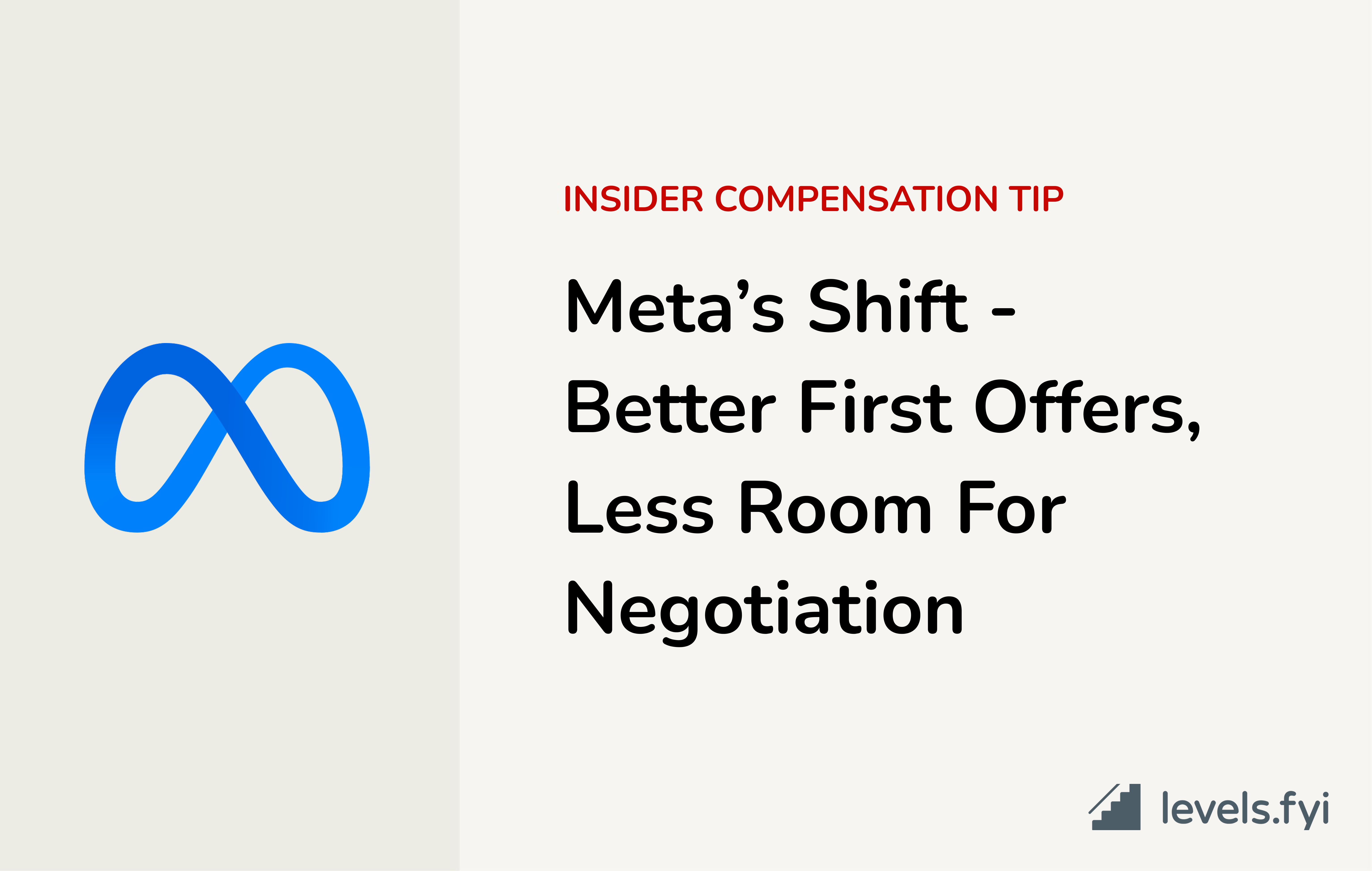Across the industry, companies have been shifting compensation philosophies as well as working arrangements toward higher performance. From shifting bonus structures and vesting schedules, to RTO announcements and layoffs, the tech industry as a whole has stated: "we're looking to optimize performance, and we'll do whatever it takes to get there."
Meta certainly follows this trend, with performance-based layoffs being one of their ways to turn up the heat for their employees. But, interestingly, they have yet to shift their compensation practices. In fact, they've adopted a "new" negotiation strategy that our coaches have noted---one that puts more burden on the candidate to know their stuff.
Shifts in the Broader Market

Recently, Nvidia switched to a front-loaded vesting schedule, away from their standard 4-year even vesting schedule, following companies like:
- DoorDash
- Uber
- And many others!
Front-loaded vesting schedules mean companies can align rewards with higher performance, offering top-ups through refreshers based on merit. Additionally, front-loaded vesting helps companies attract top talent through larger equity portions early on, which can be a strong lure for candidates trying to weigh different offers.
📈 For a more comprehensive report on vesting schedules, email us at team@levels.fyi
As for performance bonuses, Google and Amazon have both recently announced that they'll be shifting their bonus structures to better reward and incentivize high-performers.
Google announced on April 30th that they'd be increasing bonuses for high performers receiving the "Outstanding Impact" rating and also increasing the amount of employees that can be eligible for this bonus.
Amazon also recently updated its compensation structure to better reward top performers over longer periods of time. Employees who maintain a "Top Tier" rating for four consecuitive years will now receive 110% of their pay range, up from the previous cap of 100%.
Not to mention the influx of "performance-based" layoffs from companies like Microsoft in January 2025, Meta in February, and Block in March (via an all lower-case email from CEO Jack Dorsey...).
Meta's Updated Negotiation Strategy

The most recent of these developments, however, is Meta's shift in negotiation strategy—likely coming from the broader trend toward performance-based compensation.
Specific to Meta, but consistent with Google and other direct hiring competitors, there is more month-to-month movement for what compensation teams are determining to be the threshold of what they'll offer certain levels.
What that means is, when dealing with Meta, when compensation data (current or other offers) is presented before the first offer is made, the initial offer is a little bit lower than it used to be. Meta has consistently been requesting more up-front compensation data and making initial offers closer to best and final than previously.
This process is also aligning with their team matching process: instead of having six teams to pick from, Meta is often offering 1 or 2 teams. Pair that with making a better first offer, but with less room to increase the package after the initial offer, Meta is trying to be much more efficient with their final steps of the hiring process.
They would rather have someone sit in team matching for 6 weeks, but once identifying 1-2 teams, they want to move quick from there.
Internally, one of our negotiation coaches says he strongly believes the average time from team match to confirmed offer is 2-3 weeks faster than any point before this year on average, which is an important efficiency metric for recruiting teams.
💡 But, notably so, there is still room to negotiate.
Now, though, when the candidate is requested to detail the quantitative justifications up-front, it increases the necessity for negotiation coaching to frame how you make the request. It's awkward to restate the same data that you already did in order to justify an increase, because now it's easier for the comp team to say we already considered that. Instead, framing your request around certain categories---Y1 cash, overall TC balance, cash vs stock, etc. helps a lot in the negotiation process.
Now, it's much more about why you are asking for more *because *we already know what you shared with us\. Re-framing the data into broader categories, especially when competitors are front loading their vesting more often, is critical to maximizing compensation with Meta
👨💼 Check out our Levels.fyi negotiation coaching service here!
Overall, the shift in vesting schedules being front loaded is creating a dynamic where compensation requests are almost always being framed by the company as "Y1 comp", eliminating previous negotiation strategies of saying "I want more because Y2 is a drop."
So everything is becoming centered around Y1, and for companies like Meta that are still vesting an even 25% over 4 years, this may be why they are trying to not overpay for Y1 when they are guaranteeing more consistent pay year-over-year with their TC compared to Google, Meta, NVIDIA, DoorDash, Pinterest, etc
Meta is willing to pay less in Y1 given the stability, and every other company is only talking about Y1 comp. Knowing how to frame that to your advantage to get an increase in your Meta offer is now more important than ever, and knowing how these front-loaded vesting companies are thinking about comp philosophy is equally as critical.
Happy negotiating!

